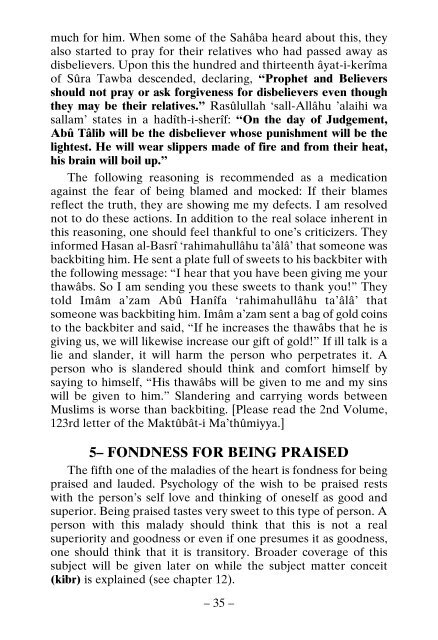Ethics of Islam
Ethics of Islam is taken from the book Berîka by Muhammad Hâdimi. Immorality and ways to get rid of it; 40 depravities and cures to them; usefulness of ethics; what is a soul; strengths of a soul; Personalities emanating from wisdom, courage, chastity and justice are extensively explained.
Ethics of Islam is taken from the book Berîka by Muhammad Hâdimi. Immorality and ways to get rid of it; 40 depravities and cures to them; usefulness of ethics; what is a soul; strengths of a soul; Personalities emanating from wisdom, courage, chastity and justice are extensively explained.
You also want an ePaper? Increase the reach of your titles
YUMPU automatically turns print PDFs into web optimized ePapers that Google loves.
much for him. When some <strong>of</strong> the Sahâba heard about this, they<br />
also started to pray for their relatives who had passed away as<br />
disbelievers. Upon this the hundred and thirteenth âyat-i-kerîma<br />
<strong>of</strong> Sûra Tawba descended, declaring, “Prophet and Believers<br />
should not pray or ask forgiveness for disbelievers even though<br />
they may be their relatives.” Rasûlullah ‘sall-Allâhu ’alaihi wa<br />
sallam’ states in a hadîth-i-sherîf: “On the day <strong>of</strong> Judgement,<br />
Abû Tâlib will be the disbeliever whose punishment will be the<br />
lightest. He will wear slippers made <strong>of</strong> fire and from their heat,<br />
his brain will boil up.”<br />
The following reasoning is recommended as a medication<br />
against the fear <strong>of</strong> being blamed and mocked: If their blames<br />
reflect the truth, they are showing me my defects. I am resolved<br />
not to do these actions. In addition to the real solace inherent in<br />
this reasoning, one should feel thankful to one’s criticizers. They<br />
informed Hasan al-Basrî ‘rahimahullâhu ta’âlâ’ that someone was<br />
backbiting him. He sent a plate full <strong>of</strong> sweets to his backbiter with<br />
the following message: “I hear that you have been giving me your<br />
thawâbs. So I am sending you these sweets to thank you!” They<br />
told Imâm a’zam Abû Hanîfa ‘rahimahullâhu ta’âlâ’ that<br />
someone was backbiting him. Imâm a’zam sent a bag <strong>of</strong> gold coins<br />
to the backbiter and said, “If he increases the thawâbs that he is<br />
giving us, we will likewise increase our gift <strong>of</strong> gold!” If ill talk is a<br />
lie and slander, it will harm the person who perpetrates it. A<br />
person who is slandered should think and comfort himself by<br />
saying to himself, “His thawâbs will be given to me and my sins<br />
will be given to him.” Slandering and carrying words between<br />
Muslims is worse than backbiting. [Please read the 2nd Volume,<br />
123rd letter <strong>of</strong> the Maktûbât-i Ma’thûmiyya.]<br />
5– FONDNESS FOR BEING PRAISED<br />
The fifth one <strong>of</strong> the maladies <strong>of</strong> the heart is fondness for being<br />
praised and lauded. Psychology <strong>of</strong> the wish to be praised rests<br />
with the person’s self love and thinking <strong>of</strong> oneself as good and<br />
superior. Being praised tastes very sweet to this type <strong>of</strong> person. A<br />
person with this malady should think that this is not a real<br />
superiority and goodness or even if one presumes it as goodness,<br />
one should think that it is transitory. Broader coverage <strong>of</strong> this<br />
subject will be given later on while the subject matter conceit<br />
(kibr) is explained (see chapter 12).<br />
– 35 –

















